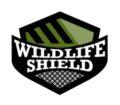- Inspection
- Removal
- Humane
- Affordable
- Guaranteed
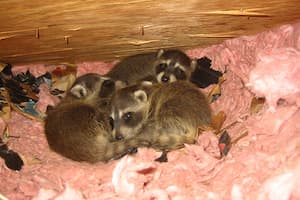
The attic of a home serves as a warm, safe, quiet place where an expecting mother raccoon can birth her babies and raise them. In fact, the mother will often give birth not long after turning your attic into her new den. After birth, the mother will nurse the pups for approximately ten weeks. Once the babies finish nursing, the mother will take them out at night and teach them to forage for food.
All in all, it does not seem like much of a problem. Unfortunately, it is a big problem that can lead to unwanted expenses for a homeowner. Raccoons can tear up insulation that they use as nesting material. They can also damage roofing systems. If that isn’t bad enough, take into consideration that they can also pose hazards to human and pet health.
The best way to deal with the situation is to remove the mother and her babies from the attic. Of course, the process is not as simple and straightforward as it sounds. There are several federal and provincial laws in place that protect wildlife and their young. For that very reason, there are professionals in place who will come and remove raccoons and their pups.
A professional can provide you with baby raccoon removal that strictly adheres to federal and provincial guidelines. Failure to adhere to the guidelines could result in a hefty fine and potential criminal charges based on animal cruelty.
Understanding the Baby Raccoon Removal Process – What Can You Expect?
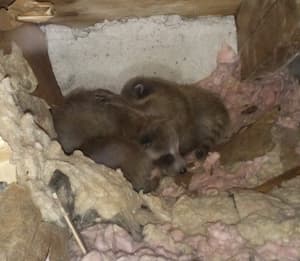
When it comes to removing baby raccoons, there are some important things you should know, such as:
- The captivity process must be carried out carefully enough that the mother and pups are not separated
- Once trapped, the mother and her pups must be provided with food and water
- If the pups are separated from their mother during the removal process, they must be properly cared for and fed until they reach 6 weeks of age, which is an appropriate age for release back into nature
- Getting in contact with Animal Shelters is recommended since they have the means to care for and rehabilitate orphaned pups so they learn to survive in the wild
- Inhumane methods of capture and other violations of federal and provincial guidelines and laws can result in a fine of up to $5,000
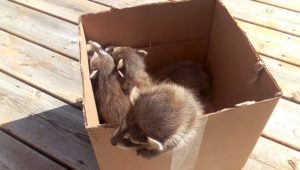
The removal of baby raccoons requires a keen understanding of local guidelines and an approach that is both kind and caring. Fortunately, we provide baby raccoon removal services in such a way that it benefits you and the mother and pups involved. We use methods that ensure the raccoon family stays together. We also transport them to a safe location where they have access to food and water.
Everything You Didn’t Know About Baby Raccoons
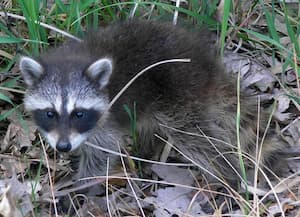
- When a mother raccoon gives birth, she usually has 8 babies, but only 2-4 of them survive
- The mother will forage for food and bring it to her babies for the first 10 weeks after birth
- Once babies reach 10 weeks of age, the mother will take them on night raids so they can learn to forage for food
- Female raccoons have a strong maternal instinct and will not orphan their babies unless conditions are severe enough and leave her with no choice
- Baby raccoons are commonly referred to as “kits”
- Although a raccoon does not hibernate, they will often sleep for approximately 2 or 3 days when weather conditions are extreme
- Raccoons rely on their sense of touch and smell to find food rather than their sight
If you happen to locate baby raccoons anywhere in your home or on your property, do not make any attempts to move them. Even if you find baby raccoons and there is no mother in sight, do not assume she orphaned them. Instead, ask a professional for help with baby raccoon removal.
Should you find an adult raccoon on your property or somewhere in your home, do not wrongly assume that it is the only raccoon on the property. The adult might very well be a female with pups. A professional can ensure the capture of every living raccoon on the property, including pups.
They can safely capture mothers and their babies to ensure their safety and comfort. If you attempt to remove babies, you could cause accidental harm, fear, or separation. In such cases, you can find yourself in violation of local laws and provincial guidelines. Rather than facing criminal charges, allow us to assist you with baby raccoon removal.
One of our trained technicians can provide you with the services you need to ensure the proper removal of baby raccoons. Make sure you contact us as soon as you suspect there are raccoons on your property to avoid unwanted damages and health hazards.
